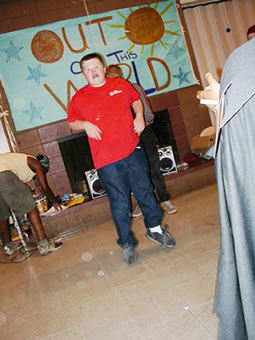Weight
Management
Weight management is important to every individual. Obesity is associated with excess morbidity and mortality across all populations. Children with Down Syndrome (DS) have a tendency to be overweight, which predisposes them to overweight in adolescence. A number of studies have demonstrated a greater prevalence of obesity in the (DS) population.
- Magge, S. et al. (2007) - Children with DS have significantly higher body mass index, body fat and levels of the hormone leptin, which may explain their increased risk of obesity. DS may predispose genetic resistance to leptin which normally suppresses appetite and regulates body weight.
- Melville, C. et al. (2005) - within the study population, DS females were more likely to be obese than DS males compared to their matched general population controls.
- Rubin, S. et al. (1998) - Measured by Body Mass Index, persons with DS had higher prevalence of overweight than the general population. DS persons living at home were more likely to be overweight than those living in a group home setting.
Safe weight gain management in teens with DS should begin with a complete annual physical assessment. The assessment should also include:
- Thyroid function tests (free T4 and TSH)
- Auditory exam
- Ophthalmologic exam
- Dental exam every 6 months
- Consult with reproductive health specialist experienced in DS care
Hypothyroidism is a condition known to affect as many as 30% of DS individuals before 25 years of age. Symptoms may include: fatigue, lethargy, weight gain, decreased appetite, sleepiness, cold intolerance, depression, etc. Along with free T4 and TSH thyroid antibodies should be tested if hypothyroidism is suspected.
Regular Physical
Activity
Regular physical exercise
helps adolescents with DS manage their weight while improving their
muscle strength, endurance, balance, and coordination. Organized recreation
programs can be highly effective ways to motivate teens to enjoy regular physical
activity, and to increase community involvement and interaction.
 Like
any adolescent, the teen with DS will be more likely to engage in
regular physical activity if that activity is age appropriate and based on the
interests of the teen and family members. Accessibility and availability are
also important considerations. Some good choices for adolescents with DS
include:
Like
any adolescent, the teen with DS will be more likely to engage in
regular physical activity if that activity is age appropriate and based on the
interests of the teen and family members. Accessibility and availability are
also important considerations. Some good choices for adolescents with DS
include:
- walking
- hiking
- dancing
- running
- aerobics
- skating
- skiing
- cycling
- horseback riding
- swimming
- weight training
- bowling
- softball
- volleyball
- soccer
- tennis
- golf
Nurses working with adolescents
with DS can be instrumental in overcoming barriers to exercise. Teens
with DS are more likely to engage in regular exercise if they receive
encouragement and instruction from others, and if they have someone to exercise
with. Some teens may prefer to exercise with family members, while others are
more peer-oriented.
In addition to encouraging
the teen to exercise, the nurse can locate appropriate sources of instruction.
For some teens with DS, regular group or private lessons offered
at a community agency or fitness center will provide the right level of instruction
and support. Others may need the services of adaptive physical education instructors
skilled in working with individuals with disabilities. Adapted recreation programs,
such as bowling leagues or swim programs for adolescents with disabilities,
can be terrific sources of instruction and provide peers to exercise with.
INSTANT
FEEDBACK:
Team
sports are not recommended for teens with Down syndrome as they do best in individual
settings.
A Healthy Diet
All too often, adolescents
with Down syndrome are not involved in the decision-making process when it comes
to dietary choices. Whether they live at home with family, in a group setting,
or in boarding programs, teens with DS should actively participate
in their weight management. Joan Medlen, R.D. has developed a "rule of thumb", the following nutrition guidelines
work well for adolescents with DS:
- Plan and eat three meals
a day
- Eat meals at least every
five hours; if meals must be more than five hours apart, plan healthy snacks
- Include three out of
the five food groups in every meal
- Include two out of the
five food groups in every snack
- Don’t worry about
including the "sometimes"/"other" food groups - they’ll
end up in the diet anyway
- Take half of the portion
you feel like eating. When that’s gone, set the timer for 15 minutes.
If still hungry when the timer goes off, it’s okay to have seconds
Medlen's Keys weight management include:
- Create an environment
that promotes healthy lifestyles, leading by example
- Demonstrate an attitude
of complete acceptance, especially if the teen is overweight
- Don’t be obsessed
with the teen’s weight, food choices, or the negative consequences of
being overweight
- Discuss concerns without
being the "food police"
- Don’t ignore the
teen’s food preferences
- Involve the teen in menu
selection and snack choices
- Teach food shopping and
preparation skills
RnCeus.com
 Like
any adolescent, the teen with DS will be more likely to engage in
regular physical activity if that activity is age appropriate and based on the
interests of the teen and family members. Accessibility and availability are
also important considerations. Some good choices for adolescents with DS
include:
Like
any adolescent, the teen with DS will be more likely to engage in
regular physical activity if that activity is age appropriate and based on the
interests of the teen and family members. Accessibility and availability are
also important considerations. Some good choices for adolescents with DS
include: